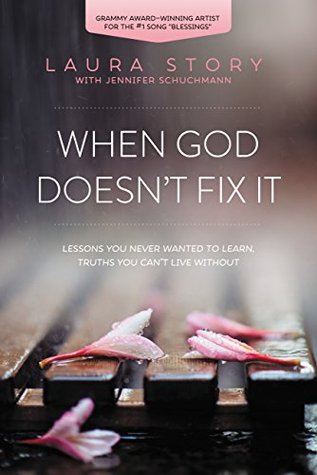More on this book
Community
Kindle Notes & Highlights
by
Laura Story
Read between
November 16 - November 17, 2020
Am I going to let my circumstances determine my view of God, or am I going to let God determine how I view my circumstances?
Then my father stepped in—literally. “Let me go first, and I want you to walk in my steps. Put your foot down where I lift mine up. That way the snow will be packed underneath you, and you can make it to the top of the hill.” Just put your feet exactly where I put my feet. I think of that image every time I think of God preparing good works in advance for us. All we have to do is follow him, our feet stepping where his feet have already made a path. The hard work has been done. We don’t have to blaze a trail; we just have to put our feet exactly where our Father leads us.
I no longer believe the myth that trials are a curse. Trials are an opportunity. They are an invitation to do good works to glorify our Father in heaven, to transform our lives from the inside out, and to drive us into the arms and footsteps of Jesus.
But while we’re focused on the unhealed sickness, hurt, and pain in our lives, God is focused on a bigger picture. Something else is broken, and it has eternal consequences if it doesn’t get fixed. It’s our relationship with our Creator.
Jesus came to heal, but he doesn’t always fix the broken things I want fixed. But if I allow him to, God will always heal my broken relationship with him.
James is saying that when the trials of life happen, we need to hold on to God. It’s an opportunity for us to look in the dark for the less obvious blessings and mercies of God that we might overlook in the light. When we do, God shows us things that we otherwise might miss. God’s light is brightest in the dark.
it was a relief to know that God’s hold on
my life wasn’t contingent on my hold on him.
“The whole world could be against your husband, but as long as you are for him, you give him wings. And if the whole world is for him, but you’re against him, it’s like pouring concrete in his shoes.”
“Are you spending more time worshipping from the stage or in private?”
We often think about worship as the songs we sing in church, but the truth is that worshipping God is about surrender. Surrendering to God’s will when it doesn’t match ours or when we’re too impatient to wait for him. Surrendering that which is most important to us. And surrendering our personal story to live out our part in God’s greater story. Worship is surrendering everything for God, valuing God so much that we’re willing to let everything else go.
We don’t gain God’s blessings by hanging on. We gain them by letting go. And when we gain them, that’s when we can use them to bless others.
No matter what God asks, I pray that my hands are open and my grip is loose. Take what you will. And what you bless me with, I will use to bless others.
promise you will find more purpose and joy in your life if you set aside the why and begin to ask how.
the Psalms revealed to me that worship had very little to do with emotion and everything to do with God’s faithfulness.
1). Worshipping God was an act of David’s will, not his emotions.
I found that when I assumed the posture of worship, my emotions usually followed.
the simple act of worship birthed the desire to worship.
The story we’re living in is God’s story. In this context, broken doesn’t mean disabled; it means enabled to point to Jesus instead of ourselves. Sinner doesn’t mean failure; it means need for a Savior.
God is the hero of the broken story.
What we have to individually figure out is what it looks like for us to get better even when our circumstances don’t.
To be better in our brokenness isn’t to remove the brokenness; it’s to remove the selfishness, pride, impatience, or other sinful behaviors we blame on the brokenness. When we stop blaming our situation on the brokenness, we begin to see that the brokenness is a trial designed specifically for us.
God
wastes nothing.
Joy doesn’t come from our circumstances; it comes from our God. And since God is with us during our trials, it is possible to have joy even in our trials. Joy is in the Lord. Brokenness is in the world. As long as we’re alive, both will coexist on earth.


